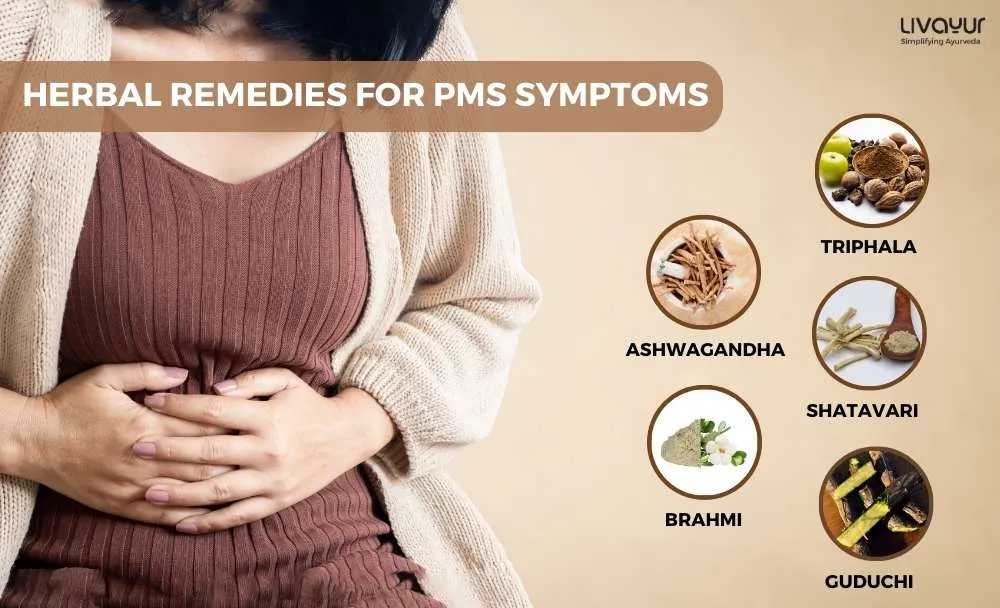This article is reviewed by an expert

Premenstrual Syndrome (PMS) is a common condition experienced by many women during the menstrual cycle. It refers to a collection of physical, emotional, and behavioral symptoms that occur in the days or weeks leading up to menstruation. These symptoms can vary in intensity and duration, affecting the quality of life for women experiencing them. In this comprehensive article, we will explore the symptoms and causes of PMS from an Ayurvedic perspective, offering valuable insights and natural approaches for managing this condition.
Symptoms of PMS [1]
PMS symptoms can manifest differently in individuals, but some commonly reported symptoms include:
- Mood changes
Women may experience mood swings, irritability, anxiety, depression, or increased sensitivity during PMS.
- Breast tenderness
Some women may notice breast swelling, tenderness, or discomfort.
- Fatigue and low energy
PMS can cause feelings of fatigue, lethargy, and a lack of motivation.
- Abdominal discomfort
Many women experience bloating, cramping, or a sensation of heaviness in the lower abdomen.
- Changes in appetite
PMS can lead to food cravings, increased hunger, or altered eating patterns.
- Headaches and migraines
Some women may experience headaches or migraines during the premenstrual phase.
- Sleep disturbances
Difficulty falling asleep, staying asleep, or experiencing restless sleep can occur.
- Acne breakouts
The skin may become more prone to acne, pimples, or other skin issues during PMS.
- Digestive issues
Symptoms like constipation, diarrhea, bloating, or nausea can arise.
- Joint and muscle pain
PMS can cause muscle aches, joint pain, or general body discomfort.
- Changes in libido
Some women may notice a temporary decrease or increase in sexual desire.
- Cognitive changes
PMS can impact cognitive function, leading to difficulty concentrating or memory issues.
Causes of PMS [1]
The exact causes of PMS are not fully understood, but hormonal fluctuations play a significant role. Changes in estrogen and progesterone levels, as well as serotonin imbalances, are believed to contribute to PMS symptoms. Additionally, factors like genetics, stress, lifestyle choices, and underlying health conditions may influence the severity and occurrence of symptoms. Here are some factors that can cause PMS: [1]
- Hormonal Fluctuations: are considered a primary cause of PMS. In the menstrual cycle’s luteal phase, which occurs after ovulation and before menstruation, there is a marked increase in progesterone and a subsequent decrease in estrogen levels. These hormonal shifts can affect neurotransmitters such as serotonin, leading to mood swings, irritability, and emotional changes commonly associated with PMS. Additionally, prostaglandins, which are hormone-like substances involved in inflammation and pain, may play a role in PMS symptoms. Elevated levels of prostaglandins can contribute to physical discomfort, including breast tenderness and abdominal bloating.
- Psychological and Emotional Factors: Stress can exacerbate symptoms, possibly due to its impact on hormone regulation and neurotransmitter function. Women with a history of depression or other mood disorders may be more susceptible to experiencing severe PMS symptoms.
- Diet and Lifestyle Choices: Poor nutrition, high caffeine intake, and lack of exercise have been linked to increased PMS severity. The relationship between PMS and these factors is complex and may vary among individuals.
Ayurvedic Perspective on PMS [2]

Ayurveda, the ancient Indian system of medicine, offers valuable insights into understanding and managing PMS. According to Ayurveda, PMS is primarily influenced by the doshas (Vata, Pitta, and Kapha). Imbalances in these doshas can disrupt the normal functioning of the body, leading to PMS symptoms. Ayurvedic treatments aim to restore balance and harmony through various approaches:
- Dietary modifications
Ayurvedic recommendations focus on consuming a balanced diet that includes fresh fruits and vegetables, whole grains, lean proteins, and healthy fats. Avoiding processed foods, excessive caffeine, and alcohol is advised.
- Herbal remedies
Ayurvedic herbs like Ashwagandha, Shatavari, Brahmi, Guduchi, and Triphala are known for their potential benefits in managing PMS symptoms. These herbs can help balance hormones, reduce inflammation, and support overall well-being. It’s important to consult with an Ayurvedic practitioner for personalized herb recommendations and dosage.
- Lifestyle adjustments
Practicing stress management techniques, such as yoga, meditation, deep breathing exercises, and regular exercise, can help reduce PMS symptoms. Adequate sleep and rest are also essential for maintaining hormonal balance.
- Ayurvedic therapies
Certain Ayurvedic therapies, such as Abhyanga (self-massage), Shirodhara (oil pouring on the forehead), and Panchakarma (detoxification procedures), may be recommended by an Ayurvedic practitioner to alleviate PMS symptoms and restore balance.
How to Ease the Symptoms of PMS
Since PMS is a natural occurrence, you may not be able to completely diminish the symptoms, but there are remedies to help ease the pain:
Vitamin Supplements: Numerous studies show that calcium, magnesium, vitamin E, and vitamin B-6 relieve symptoms that are either scant or nonexistent.
Herbal Remedies: Some ayurvedic practices suggest that applying herb oil like ginkgo, ginger, chasteberry, evening primrose oil, helps relieve PMS symptoms. Some scientific research, nevertheless, has discovered that any plant can effectively reduce PMS symptoms.
Acupuncture: Sterilized stainless steel needles are inserted into the skin at predetermined bodily locations by an acupuncturist. After receiving acupuncture, several women report feeling less symptomatic.
When To See A Doctor
Not every woman has PCOS. However, some may have severe symptoms that interfere with their day-to-day activities. If you think you need assistance controlling your symptoms, you must talk to your doctor. Although PMS can strike at any stage of your reproductive process, it can get worse during menopause.
Conclusion
PMS is a common condition experienced by many women, but it doesn’t have to disrupt their lives. By understanding the symptoms and causes of PMS and embracing an Ayurvedic approach, women can find natural ways to manage their symptoms effectively. Ayurveda emphasizes the importance of balancing the doshas, adopting a wholesome lifestyle, and utilizing herbs and therapies to promote overall well-being. Consultation with an Ayurvedic practitioner is recommended for personalized guidance on managing PMS symptoms and optimizing women’s health.
FAQs (Frequently Asked Questions)
How does PMS affect daily life?
PMS can affect daily life as you will feel pains in your body including abdominal pain, headaches, migraines, backache, and swollen tender breasts. You might also find you are more irritable, nervous, or depressed. You might have mood swings and difficulty sleeping.
How can I prevent premenstrual syndrome?
You can reduce the chances of PMS by:
Engaging in regular exercise three to five times a week.
Consuming a diet rich in variety.
Eating less salt, sugar, caffeine, and alcohol and more fruits, vegetables, and whole grains.
Making time to rest and sleep enough.
Avoid smoking.
How do you manage PMS symptoms?
To lessen bloating and fluid retention, limit your intake of salt and salty meals. Select meals high in whole grains, fruits, and vegetables that are high in complex carbs. Select calcium-rich foods. A daily calcium supplement may be helpful if you are intolerant to dairy products or if your diet isn’t providing enough calcium.
Can PMS symptoms be relieved naturally?
Yes, adopting an Ayurvedic lifestyle, including dietary changes, herbal remedies, and stress management techniques, can provide natural relief from PMS symptoms. Consultation with an Ayurvedic practitioner is recommended for personalized guidance.
How can Ayurveda help with mood swings during PMS?
Ayurveda suggests incorporating herbs like Brahmi and Ashwagandha, practicing stress-reducing techniques, and following a balanced diet to support emotional well-being during PMS.
Are there specific foods to include or avoid for managing PMS symptoms?
Including fresh fruits, vegetables, whole grains, and healthy fats in your diet is beneficial. It is advisable to avoid processed foods, caffeine, and alcohol as they can exacerbate PMS symptoms.
Can Ayurvedic treatments cure PMS?
Ayurvedic treatments aim to restore balance and alleviate PMS symptoms. While they can provide relief and improve overall well-being, it’s important to note that individual results may vary.
When should I consult an Ayurvedic practitioner for PMS?
It is advisable to consult with an Ayurvedic practitioner if your PMS symptoms are severe, significantly impacting your daily life, or if you require personalized guidance on Ayurvedic treatments and herbal remedies.
References:
- https://www.sciencedirect.com/science/article/abs/pii/S030121150400243X
- https://wjpr.s3.ap-south-1.amazonaws.com/article_issue/a1587e3d7dfbc68da3bad9b7eea98da7.pdf
Easy Yoga asanas for Premenstrual Syndrome [PMS] Pain and Discomfort (Download Ebook)
















